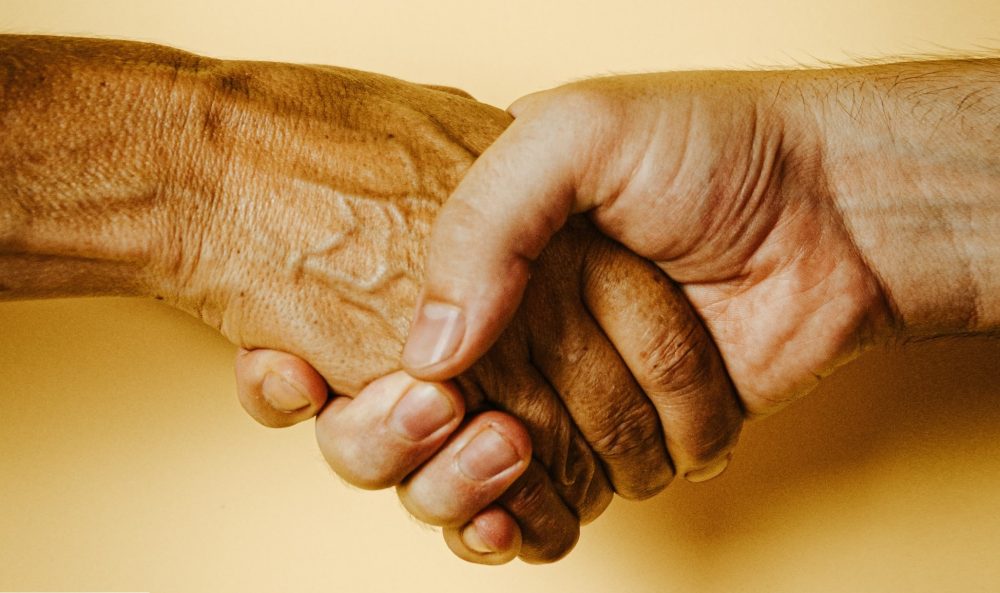
Most of us are familiar with First Aid, perhaps less so with Last Aid.
Historically, First Aid and Last Aid are both linked by the founder of the Red Cross, Henry Dunnant.1 In 1859, at the battle of Solferino, he was shocked by the suffering of the soldiers. He worked to treat wounded men, delivering what we now call First Aid. However, it was also reported that – ‘He knelt beside severely wounded people who begged him to stay by their side until their last breath so that they would not die alone’. This approach to care may now be referred to as ‘Last Aid’ and has been promoted by Prof Georg Bollig in Europe.2 One of the most distressing aspects of this pandemic is that so many people have died in isolation.
Some patients may have received the wrong type of ‘Aid’ when they became seriously unwell.
As a 61 year old former Lancaster GP who used to work both in A+E and the local hospice at the same time, I believe that some patients may have received the wrong type of ‘Aid’ when they became seriously unwell in the COVID-19 pandemic, usually due to the extraordinary pressure that our health system is under coping with the new virus.
This opinion was formed when I worked as a COVID-19 returning doctor full time in palliative care during the first wave, with a focus on care homes. I am now clinical lead for Primary Care for Lancashire and South Cumbria Palliative and End of Life Care Clinical Network and a Lancaster COVID-19 vaccinator. This is the second pandemic I have worked in, having spent two years in Zambia in 1988 during the HIV/AIDS pandemic where I developed an interest in End-of-Life Care. There is still no vaccine for HIV. What has been achieved with the COVID-19 vaccination programme is truly spectacular.
As well as the importance of vaccination, lessons about the importance of personalising care could be learned from the stories told by the patients and their carers during this pandemic that may help us all for years to come.
Modern definitions relating to these types of urgent ‘aid’ are: –
First Aid: Measures to help with acute injury and illness with the primary goal of ensuring the survival of those affected.
Last Aid: Measures to help in the case of life-threatening diseases with the primary goal of alleviating suffering and maintaining quality of life.
In First Aid the primary survey is a quick way to structure care in any life-threatening collapse. DR ABC is the aid memoire commonly used to help us do this: Danger, Response, Airway, Breathing and Circulation.
During the COVID 19 pandemic, the danger of infection during close contact with patients and possible resuscitation has been very real, and an urgent response and call for professional assessment has usually been essential. An unintended consequence of ‘protecting the NHS’ may have been that COVID-19 patients and others (mostly frail elderly) with deteriorating health were not given the opportunity to be thoroughly assessed and perhaps they were not offered the breathing and circulatory support in hospital that could have saved their lives. This has given added impetus to the RESTORE 2 initiative in care homes.3
Potentially correctable conditions, such as hypoxia, should always be given the chance of being corrected if possible….
With both First Aid and Last Aid, potentially correctable conditions, such as hypoxia, should always be given the chance of being corrected if possible, and if the person wants it. I doubt that this has always been achieved, especially early in the pandemic, due to the exceptional circumstances caused by dealing with a new disease. Lessons have been learned but finding capacity to cope with the large number of unwell patients needing assessment in both primary and secondary care has been challenging.
Last Aid … is about encouraging and empowering carers to confidently support proactive…. palliative care.
Last Aid knowledge is about encouraging and empowering carers to confidently support proactive rather than reactive palliative care. If there is ever any uncertainty about what carers should do when faced with a life-threatening situation, it is still best practice for them to opt for ‘First Aid’ and life sustaining treatment.
DR ABC can again be a useful acronym. This may be less familiar than in First Aid so I will give more detail.
D – Dying is a ‘normal’ part of life but until the recent COVID-19 pandemic it was an unfamiliar experience to many families. It is important not to ‘over medicalise’ a normal human experience but some professional involvement and support with important conversations during the last years of life is inevitably needed to help with ‘Deciding Right’ when health challenges arise.4 Avoiding unwanted futile medical intervention is good for all involved.
A positive and supportive way of helping someone approaching death is by finding out what matters most in their lives.5 This allows carers to make an appropriate decision about calling for help when the need arises.
R – Record, and appropriately share electronically what matters most to a person ideally on an Electronic Palliative Care Coordination System (EPaCCS). Multiple unsolicited end-of-life care conversations are exhausting for all involved.
A – Advance Care Planning (ACP) is the complete voluntary process that allows a person not only to state preferences, but also to produce legally valid documents to refuse certain treatments and appoint an attorney to help if the person cannot speak for themselves.6 Adverse publicity about ACP and negative ‘blanket decisions’ early in the pandemic risked undermining public confidence in the benefits of ACP, that is why reframing ACP as ‘what matters’ conversations may help.
The presence of a Do Not Resuscitate Form or RESPECT form does not mean all treatments have been refused.
It is important to recognise that the presence of a Do Not Resuscitate Form (DNACPR) or RESPECT form does not mean all treatments have been refused or that, for example, oxygen treatment for COVID-19 induced hypoxia should not be considered if it is indicated.
B – Bereavement is a challenging time for all of us, often more complex during this pandemic. Knowledge about bereavement reactions can help us to help ourselves and others. Knowing what is important to a beloved person can help you to make last days as good as possible and this can help to reduce the severity of bereavement reactions. “The way we die lives on in the memory of those who survive” said Dame Cicely Saunders, the founder of the modern hospice movement.
“The way we die lives on in the memory of those who survive”
C – Control of symptoms; most deaths are peaceful, but some predictable symptoms can occur, and they can often be managed by the anticipatory prescribing of ‘just in case’ medication. For example, noisy breathing is common, often just indicating that someone is so sleepy that they cannot be bothered to swallow saliva. If necessary, this, and other symptoms can be controlled if planning is in place. For most patients, well established standards of usual palliative care practice have worked very well during the pandemic.
I believe that some people living with life limiting conditions would have preferred a ‘Last Aid’ approach but have been transferred to hospital when their preference would have been to stay in their usual place of residence and ‘take their chance’. This unwanted transfer to acute care happened when what matters to a person in their remaining days of life and their care preferences were not known or effectively communicated.
Some people … have been transferred to hospital when their preference would have been to stay in their usual place of residence.
Help is available to identify patients in general practice who may benefit from a what matters conversation, in the form of the EARLY toolkit.7 If a person’s wishes are known and shared effectively, community plans for care can be organised in a timely manner.
The Red Cross still provides excellent ‘First Aid’ training for carers, and ‘Last Aid’ training is available for community members in the UK at Highland Hospice and internationally.8 Community facing ‘Last Aid’ inspired courses are being developed in several areas often by hospices, sometimes as part of ‘compassionate communities’ initiatives.9 One course called ‘Last Days Matter’ is being developed in the North West of England
I was recently infected with COVID-19 and was delighted to accept excellent urgent expert help from GP services in Lancaster. If I had a long term progressive and incurable illness, I may have made different choices. What matters to me personally would include time being close to my wife and sons and dog, probably by a fire with a glass of red wine dreaming of walks in the Lake District. I would not want possible isolation in a hospital COVID-19 ward. I hope that, when my last days do come, I am listened to. These last days do matter.
Many healthcare staff are completely exhausted at present, but if in future we can help to deliver care shaped as much as possible around what matters most to our patients and their carers, it could be one significant positive outcome from this pandemic. Less reactive palliative care workload would be good for GPs as well as their patients.
When the pressure of dealing with the pandemic eases it could be the right time to support the campaigning work of groups such as the End-of-Life Care Thinktank ‘What matters conversations’ led by the RCGP and the Daffodil Standards for care homes.10
* Declaration of interest – member of EAPC Last Aid taskforce:-
https://www.eapcnet.eu/eapc-groups/task-forces/last-aid/
References
- https://www.icrc.org/en/doc/resources/documents/misc/57jnvq.htm
- https://www.letztehilfe.info/
- https://westhampshireccg.nhs.uk/restore2/
- https://www.northerncanceralliance.nhs.uk/deciding-right/
- https://www.whatmattersconversations.org/
- https://www.goldstandardsframework.org.uk/advance-care-planning
- http://www.cheshire-epaige.nhs.uk/wp-content/uploads/2021/01/National-Early-Identification-and-Personalised-Care-Planning.pdf
- https://highlandhospice.org/what-we-do/education-learning-development/last-aid
- https://www.compassionate-communitiesuk.co.uk/what-we-do
- https://www.rcgp.org.uk/clinical-and-research/resources/a-to-z-clinical-resources/daffodil-standards/daffodil-standard-for-older-people-in-care-homes.aspx
Featured photo by Ave Calvar on Unsplash









[…] https://bjgplife.com/first-aid-or-last-aid-during-the-covid-19-pandemic-helping-carers-with-deciding… […]